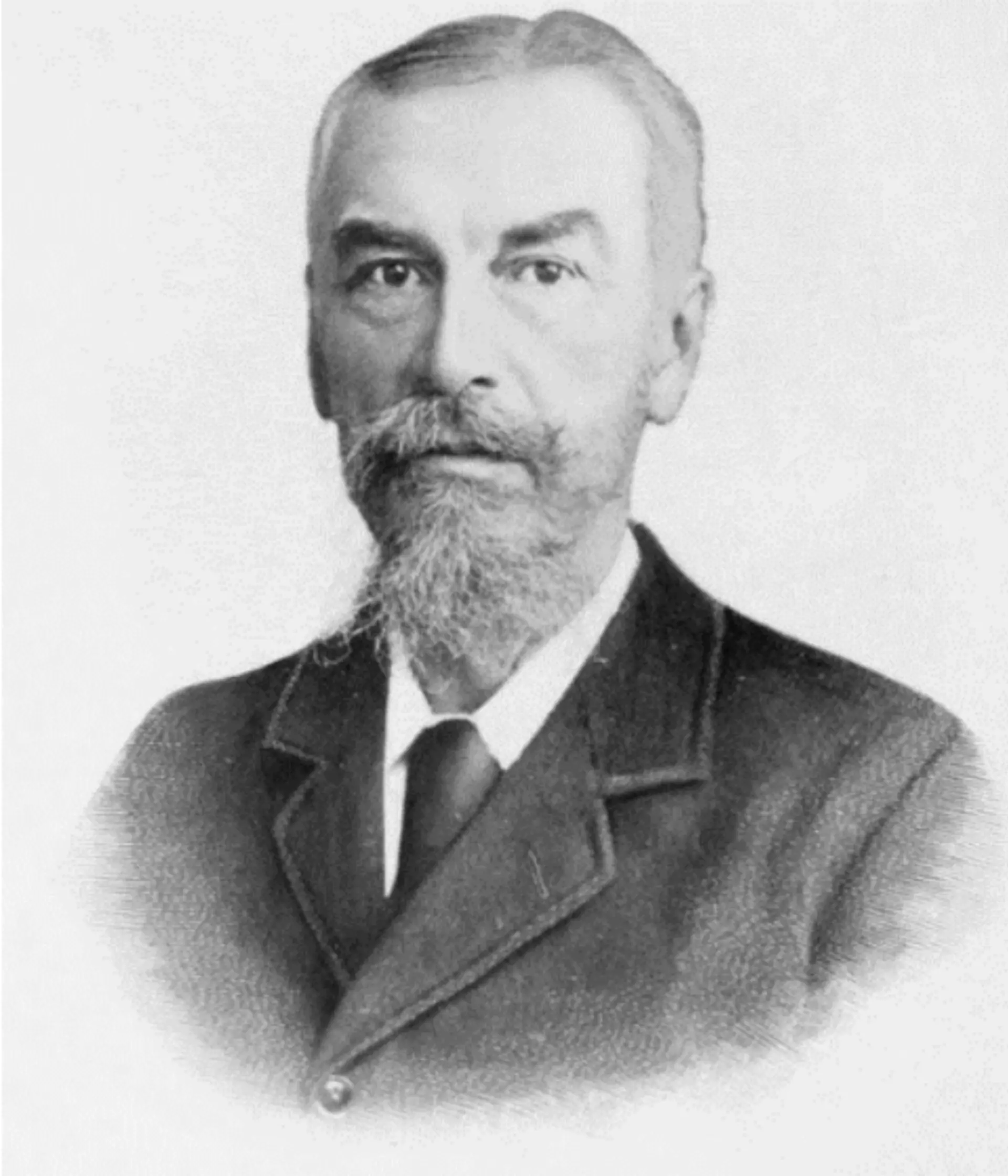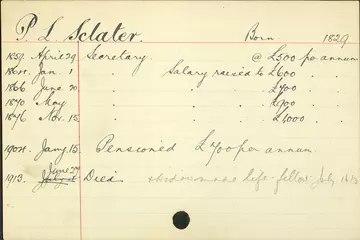
Natasha Wakely
ZSL Archivist
I joined ZSL as the new Archivist in September 2021. One of my main tasks is to produce a new online catalogue of the collections held in the ZSL Archive. I will be producing a series of blogs on the collections I undercover during this process, and this begins with the letters and papers relating to the position of Secretary at ZSL, and in particular, the letters of Philip Lutley Sclater which forms one of the largest extant collections of letters we hold in the ZSL Archive.

Philip Lutley Sclater (1829-1913) was an ornithologist, zoologist, and lawyer. In 1858 he set up six zoological regions which are still in use today. He was the founder and editor of ‘The Ibis’, the journal of the British Ornithologists’ Union, and he had a huge collection of 9000 birds which he deposited with the British Museum (Natural History). He served as Secretary of the Zoological Society of London for a grand total of 42 years from 1860-1902. ZSL Archive holds his collection of letters, and they provide an insight into the growth of the Society, his role as Secretary and what that entailed, and research into zoology during this period. Topics covered in the letters range from animals being sold by collectors and zoological research, to the management of the Gardens of the Society and elections to the Fellowship. In this blog I am going to highlight some of the letters that I have catalogued.
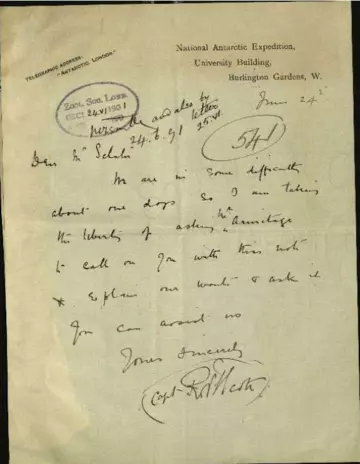
This letter was from the Royal Navy officer and explorer, Captain Robert Falcon Scott. Writing in 1901, Scott says ‘We are in some difficulty about the dogs so I am taking the liberty of asking Mr Armitage to call on you with this note and explain our wants and ask if you can assist us.’ This request relates to the British National Antarctic Expedition, later known as the Discovery Expedition, which was undertaken by Scott, Ernest Shackleton and Edward Wilson.
William Spiers Bruce, a polar explorer and oceanographer, also contacted Sclater in relation to his own expedition.
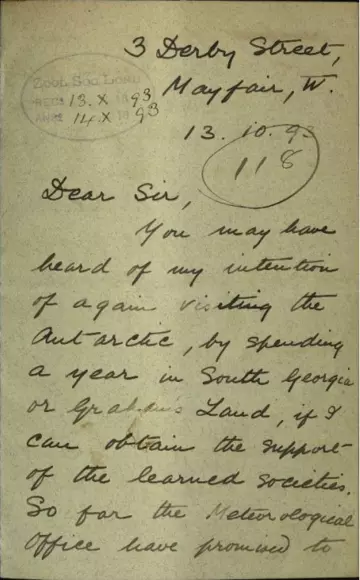
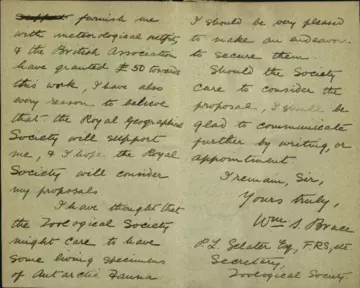
He writes ‘You may have heard of my intention of again visiting the Antarctic, by spending a year in South Georgia or Graham’s Land, If I can obtain the support of the learned societies.’ In exchange for support he says, ‘I have thought that the Zoological Society might care to have some living specimens of Antarctic fauna. I should be very pleased to make an endeavor to secure them. Should the Society care to consider the proposal I shall be glad to communicate further by writing, or an appointment.’ The Secretary was often contacted by individuals offering rare and fantastic animals from foreign climes.
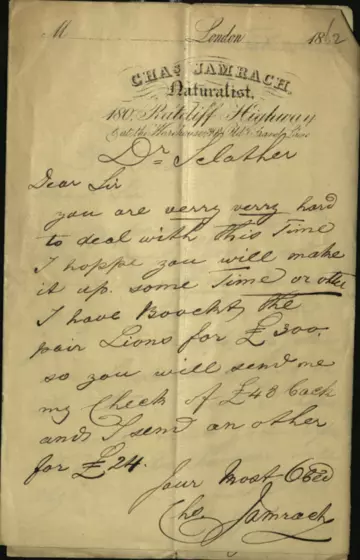
A common topic in the collection of letters is the sale and transport of animals to the Gardens. In this letter Charles Jamrach, an importer and dealer in wild animals, writes ‘You are very very hard to deal with this time. I hoppe you will make it up some time or other. I have boocked the pair of lions for £300 so will you send me my check of £40 back and I send an other for £24.’ It appears that Sclater may have been a shrewd negotiator when it came to the purchase of animals for the Zoo.
Other requests are a little more unusual in nature. Winifrid Jonston writes to Sclater to say that ‘I have a little paroquet that I should be very glad if possible to deposit for a time at the Zoological Gardens, as my Mother has taken a house in London for some weeks, and we don’t want to have it there, as its rather noisy in a small house.’ She sends her apologies that ‘its not a very interesting bird – I bought it in Tunis – but its plumage had always been very bad, and it has never grown the long tail it ought to have!’
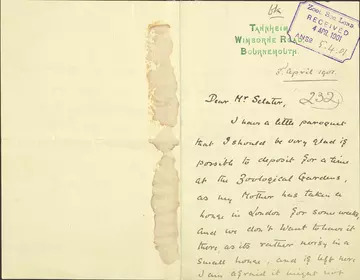
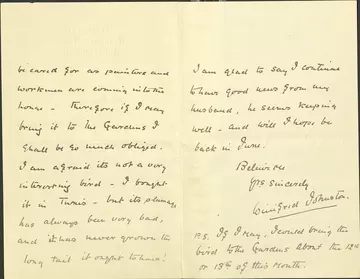
Sclater often received recommendations for individuals to study or paint in the Gardens, such as a letter from the sculptor George Frampton who is arguably best known for his statue of Peter Pan in Kensington Gardens.
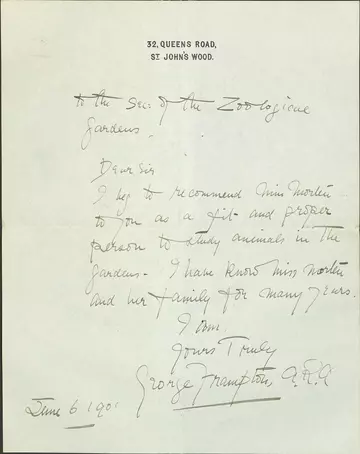
He writes ‘Dear Sir, I beg to recommend Miss Morten to you as a fit and proper person to study animals in the Gardens. I have known Miss Morten and her family for many years.’
However, Sclater also had to field complaints from visitors to the Zoo, such as is shown in the correspondence he had with a Mr. Alfred Reynolds.
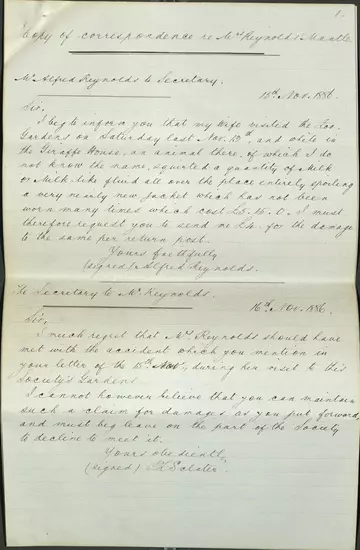
Reynold’s complains that during a visit to the Zoo in November 1886 ‘and while in the Giraffe House, an animal there, of which I do not known the name, squirted a quantity of milk or milk-like fluid all over the place entirely spoiling a very nearly new jacket which has not been worn many times which cost £5.15.0. I must therefore request you to send me £4 for the damage to the same per return post.’ Sclater replies that he regrets that Mrs. Reynold’s met with the accident, but he ‘cannot maintain such a claim for damages as you put forward.’ After further investigation, Sclater writes that ‘I think there must be some mistake in the statement you make. I find that the male Tapir, not in the Giraffe House, but in the Hippopotamus House adjoining, is sometimes in the
habit of squirting his urine outside his den. It is possible, therefore, that some of this may have fallen on the clothes of a visitor.’ He assures Mr. Reynold’s that ‘the urine of the Tapir, though nasty I admit, is not of a nature to do any permanent damage to a lady’s dress.’ He refers the matter for final decision to the Council of the Society.
To discover more about Sclater’s letters please contact the Archivist at Library@zsl.org
Thanks to Sarah Broadhurst, ZSL's former Archivist who started the catalogue. This blog is partly based on a talk she gave to the Animal History Group.
ZSL Prince Philip Zoological Library & Archives is a wonderful and unique information resource about animals and their conservation – we aim to inspire, inform, and empower people to stop wild animals going extinct.
To discover more about ZSL's history, please explore the ZSL Archive Catalogue.
Explore our Archive Catalogue
